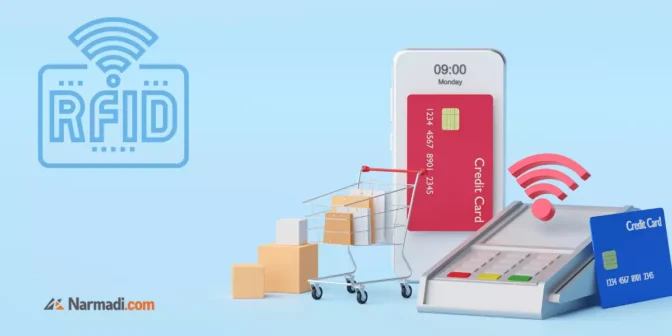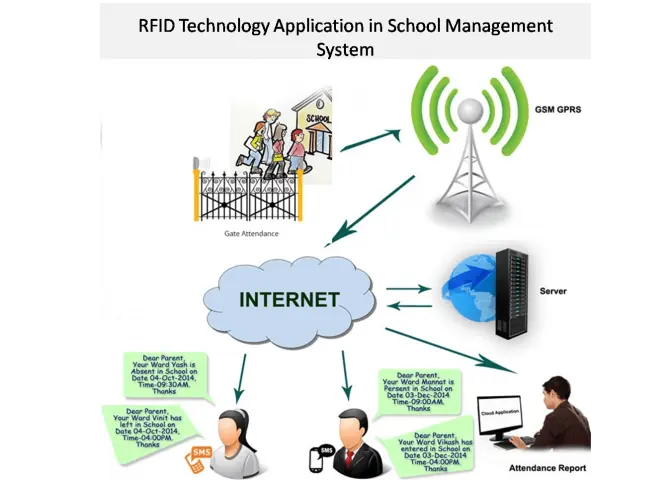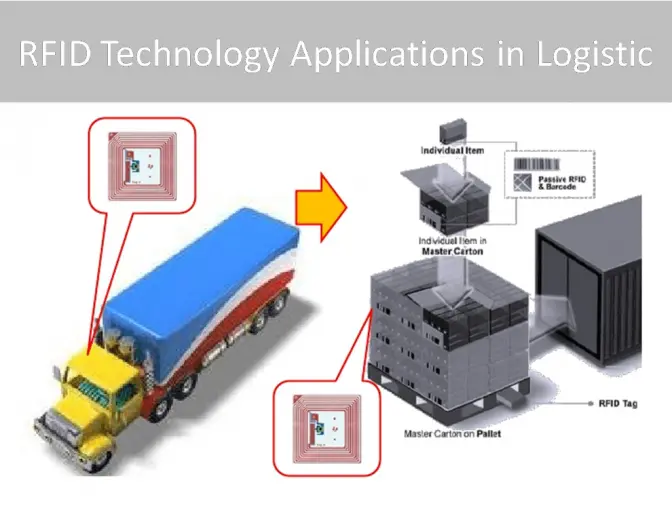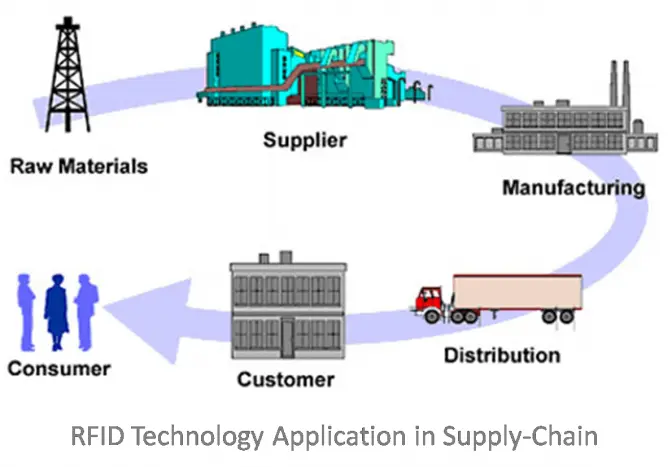Internet of Things (IOT) is the concept where all things such as vehicle, buildings, furniture, home appliance, and others are connected in one network. Through this connection, they will be able to collect and exchange from and to each other.
To make this connection possible, these things use software, actuators, and sensor which becomes part of the electronics components of these product. Therefore, these devices will be able to connect to the network infrastructure so user can control and access them remotely.
And to make this connection infrastructur possible, there are several technologies available. One of them is RFID. RFID technology has been used in so many applications world wide. This application keeps growing and extend to many aspects from security to agricultural, automotive, appliance, logistics, retail, and now automations.
With the high number of application, RFID technology could be the main tools to support IOT concept. To get you a better understanding about this, here’s the brief introduction toward this wireless technology as well as examples of some fields that we can find RFID Technology Applications in it.
RFID Technology Knowledge Base
1. What is the use of RFID?
Radio frequency identification (RFID) is one method for Automatic Identification and Data Capture (AIDC). RFID tags are used in many industries nowadays from security to agricultural, appliance, logistics, automotive, retail, and now automations.
In the automated factory, an RFID tag that is attached to an automobile during production can be used to track its progress through the assembly line. Or in the supply chain industry, the mobility of goods can be tracked through warehouses. Or, in many malls we can find automatic doors which is also possible due to the RFID sensore in it, and so many more.
2. What is the RFID technology?
Radio-frequency identification. Radio-frequency identification (RFID) is the wireless use of electromagnetic fields to transfer data, for the purposes of automatically identifying and tracking tags attached to objects. The tags contain electronically stored information which will be sent from the tag to reader by using wireless connection. RFID consist of two main components: Active reader and tags. Tags can be devided into active tags which have its own power source, and the passive one.
3. What is meant by RFID reader?
A radio frequency identification reader (RFID reader) is a device used to gather information from an RFID tag, which is attached to either moving or non moving objects which is used to track the mobility of this individual objects. Radio waves are used to transfer data from the tag to a reader.
RFID Technology Applications

Compared to the other kinds of connection such as wireless technology, NFC, Bluetooth, WLAN, Zigbee technology , and others, RFID may have the most dominant usage. We can find it everywhere in almost every aspect of life. In industry, security, monetary, communication, home appliance, or even simple things such as furniture is nowadays using RFID technology. The development of it is also massive.
Every period of time, we can see the new progress of RFID technology. This is including the variation of the existing ones, or the whole new kind of RFID technology. Therefore, this this subject will always be something interesting to discuss. And before jumping up to the RFID Technology Applications, here we are going to talk about what RFID really is in brief.
Radio-frequency Identification, or commonly known as RFID, is the kind of technology that employs electromagnetic fields to track as well as to identify tags which is attached to a certain object. This process is commonly called as the “reading” process. RFID reader will read the tag by employing electromagnetic field in order to gain the information from the tag. The tag itself is divided into two kinds, the active and passive one.
Active tag has its own power source, so it can transfer the information even from the hundreds of meters range. While for the passive one, it gains the power from nearby reader. So, it will active only when the Reader interrogates it with radio waves. With this simple and usable principle, this technology has been used virally among the world. And in order to explain you about this matter, here is the explanation about some RFID Technology applications.
Applications of RFID Technology in Maintenance Systems

One promising application of RFID technology is on the maintenance system. Especially due to the effective identification function of RFID by using radio waves, the management system will be more structured, systematic, and accurate. Moreover, RFID also allow data transfer between objects without even need the physical contact.
With this functionality, we can decrease human intervention on the data flow. So at the end, it can reduce the risk of losses, missed information, and other things that could cause the data are not well delivered. This is why RFID technology has been used in many fields of management. Some of them are military, location tracking, security, health, maintenance, and transportation.
RFID Technology for Downhole Well Applications

Well this one is new and interesting though. In the middle of energy crisis, RFID technology comes with solution in the Downhole Well industry. This is one of the RFID Technology Applications that is possibly the answer of increasing oil and gas production to provide a better life.
Currently, engineers are using the current RFID technology to help them enhancing field inspection as well as managing oil rigs safety compliances. It is good news for our sustainability of energy.
In its application, engineer place RFID tag in the casing or drill string. And when the correct code is identified in the specific downhole location, a subsequent conveyed reader will perform a certain operation.
Moreover, engineer also configures downhole tool with RFID reader. This tool will be actuated when the reader identified unique identification code from the tag in certain area inside the downhole.
RFID Technology and Its Applications in Internet of Things
We already mentioned earlier that one of the benefits of RFID technology applications is on the concept of Internet of things. Interestingly, RFID is considered as the main player of this concept compared to the other kinds of connection. This is due to the high variety of it. RFID runs in various frequency and modulation. It is different for each country standards.
In Indonesia for example, nowadays it uses 920 – 923 MHz frequency range. While for some other countries, the standard might be different. In Brazil, it uses 915-928 MHz, 902-928 MHz and 902-907.5 MHz frequency range. Japan uses 902-928 MHz frequency, and otehr coutries may use the different allocation.
Another reason for this technology to be the main supportive connection in IOT concept is the highly applicable level of it. We understand that the IOT concept tries to connect as many things as possible. And RFID technology is the most possible connection to adopt this principle. Unlike other kinds of connection such as WLAN or Bluetooth which has limited application, RFID is different. It can be applied in industry, monetary, security, home appliance, even for simple things such as furniture.
RFID Technology Business Applications

Talking about RFID Technology Applications, business might be the one that is affected a lot. If we follow the traditional believe, where business is all about profits, then RFID technology must be the key of success. Possibility of full automation which is offered by RFID is the answer.
The application of this technology in several kinds of business such as logistic, security, selling, and data management are the examples. And apparently, all these applications result on something better. It results on better management, decreasing cost, higher productivity, and lower risk which will affect on the increasing margin of business.
RFID Technology Application in Container Transportation
RFID Technology Applications now has touched the container transportation industry. With development of communication technology, the container transportation seems to be affected too. And it’s good news that this thing impacts on something better and better in this industry. Remembering that this kind of transportation plays a really big role, especially in logistic, so more refreshment and updates are needed.
This is where RFID technology takes part. This technology seems to improve some aspects in here. With the application of it, we will not see the traditional ways of information management, cargo transport, container yards, container recognition, as well as container circulation. The RFID automation will remove them all to be something accurate, efficient, and effective.
Supply-Chain Applications and Implementation Issues

One main point of RFID Technology Applications is on Supply-Chains management. This is strengthened by a publication by Rebecca Angeles that states RFID technology offers more promising ways to close the information gaps in Supply-Cain. This is especially adopted in Retail and Logistic industry.
By employing the automatic electronic identification, RFID technology will help this industry to reduce cost. This is due to the effectiveness of it in reducing man intervention since physical contact is no longer needed. Moreover, combining RFID and automation system will also be beneficial in reducing pilferage, damage, theft, and losses. Therefore, it will result on the efficient identification of goods.
Compliance Aspect of RFID Technology
One thing that people also need to consider in utilizing RFID is compliance aspect of it. Just like other wireless technologies, RFID is strictly regulated in most countries, especially because radio frequency is considered as “National Resource”. This is why authority will take part in regulating the allocation. The aim is of course, to secure frequency range for each technology, including RFID. So, there will be no interference between one and another, to create maximum performance and output.
In terms of RFID compliance, common thing that will be considered is frequency range. RFID is only allowed to operate in certain frequency range which is different from one country and another. For example, FCC allocation for RFID is 902 – 928 MHz under FCC part 15 rules section 15.247. While in CE, it allocates its 869.4 to 869.65 MHz frequency under ETSI EN 300-220 standard. The allocation might be different in other countries.
Then, how to find out whether our RFID product already complies with the local compliance regulation or not? It’s simple, just check the compliance certificate that has been obtained by the product. This infromation is usually available on product label. There, we can check the compliance symbol that represents compliance body and standard which our RFID product have complied on.
For example, in Indonesia all wireless products, including RFID, must comply with SDPPI [Directorate General of Resources and Equipment for Post and Information Technology] regulation. The sign of compliance in SDPPI can be proven by obtaining SDPPI certificatation.
For product that has obtined SDPPI certificate, we can see that it has SDPPI label affixed on the packaging and on product. Therefore, it’s not only important for manufacturer to make sure their RFID products comply with SDPPI certification, but as buyer we also need to pay attention and make sure that the product we buy has complied with SDPPI regulation.
Conclusion
With the increasing numbers of application, RFID technology will definitely bring a better life. But, the main point here is not only emphasizing on the development of the technology itself. It should also involve the user of this technology. So, as a user, we should be more aware, and sensitive to what might caused by this technology, and how to use it in proper ways. However, the possibility of abuse will always be there, especially for advanced technology like RFID. But, with more responsibility and ethics awareness, we believe that the RFID technology applications will bring nothing but good and benefits.
